 Petzlover
Petzlover Braque Francais (Pyrenean Type) is originated from France but Tenterfield Terrier is originated from Australia. Braque Francais (Pyrenean Type) may grow 27 cm / 11 inches higher than Tenterfield Terrier. Braque Francais (Pyrenean Type) may weigh 25 kg / 56 pounds more than Tenterfield Terrier. Both Braque Francais (Pyrenean Type) and Tenterfield Terrier has almost same life span. Braque Francais (Pyrenean Type) may have more litter size than Tenterfield Terrier. Both Braque Francais (Pyrenean Type) and Tenterfield Terrier requires Low Maintenance.
Braque Francais (Pyrenean Type) is originated from France but Tenterfield Terrier is originated from Australia. Braque Francais (Pyrenean Type) may grow 27 cm / 11 inches higher than Tenterfield Terrier. Braque Francais (Pyrenean Type) may weigh 25 kg / 56 pounds more than Tenterfield Terrier. Both Braque Francais (Pyrenean Type) and Tenterfield Terrier has almost same life span. Braque Francais (Pyrenean Type) may have more litter size than Tenterfield Terrier. Both Braque Francais (Pyrenean Type) and Tenterfield Terrier requires Low Maintenance.
 The Braque Francais Gascognes and the Braque Francais Pyrenees are two alike dogs that are in reality separate breeds. The Pyrenees is not as rare as his larger brother, Gascognes. Around since the 15th century at least, not mush is really known about their origins. Because the Braque Francais was exported or taken to so many different countries in the 15th-18th centuries, a lot of information regarding the origins of the breeds were lost. There was a major study done in the 19th century that showed the two dogs came from very different blood lines. It is known that in this timeframe there was an acute need for a dog that was better than the current hunting breeds. This dog needed to be able to point, track, retrieve and flush.
The Braque Francais Gascognes and the Braque Francais Pyrenees are two alike dogs that are in reality separate breeds. The Pyrenees is not as rare as his larger brother, Gascognes. Around since the 15th century at least, not mush is really known about their origins. Because the Braque Francais was exported or taken to so many different countries in the 15th-18th centuries, a lot of information regarding the origins of the breeds were lost. There was a major study done in the 19th century that showed the two dogs came from very different blood lines. It is known that in this timeframe there was an acute need for a dog that was better than the current hunting breeds. This dog needed to be able to point, track, retrieve and flush.
With no authenticated story of origin, many myths have grown up in the vacuum. The most common belief is that the Chien d’Oysel, an ancient spaniel breed that was medium sized with brown or white fur and brown markings, is an ancestor of the Braque Francais and local hunting dogs. To make the Gascognes larger and stronger than the Pyrenees, local scent hounds were also crossed with these dogs. The Pyrenees does not have these scent hounds in their background.
Until the late 1800’s, there was only one type and one breed of Braque Francais. But when the breed was no longer the dogs of a nobility, the average hunter needed a smaller dog. Urbanization following the French Revolution added to this trend and the Pyrenees Mountain hunters crossed the Gascognes with smaller scent hounds and pointers. Thus, they created the Braque Francais Pyrenees and each dog became its own breed in 1920.
The Braque Francais breed club, including standards for both breeds was established in 1850 with the standards established in 1880. This acceptance was then followed by registration of both breeds in the International Kennel Club (FCI) and the French Kennel Club. Canada recognizes only the Gascoigne and the United Kennel Club (UKC) of the United States, recognized both. Neither breed has been recognized by the American Kennel Club (AKC).
The Second World War was brutal to both types of the Braque Francais, but the Pyrenees have surpassed their sister breed and are the only one that has found its way to North America. The importers have started a breeding program in Canada. Later a few were imported to the States. There are currently at least four breeders in North America – 2 in the U.S. and 2 in Canada. It is thought that there are less than 200 Braque Francais Pyrenees living in North America.
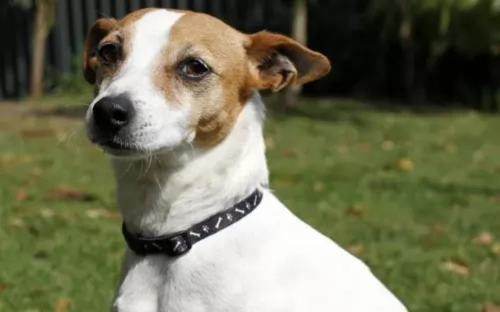 The ancestors of the Tenterfield Terrier came to Australia with the British and from them came this Australian breed. The English terriers were bred to be ratters on the ships to Australia. Today’s breed is a hardy, strong, athletic and agile dog. These first dogs were miniature Fox Terriers, bred for ratting. The miniature Fox Terrier was an established breed in the late 19th century in Australia with families and was know as a Mini Foxie. The breed became a steady presence in homes by the 1920’s.
The ancestors of the Tenterfield Terrier came to Australia with the British and from them came this Australian breed. The English terriers were bred to be ratters on the ships to Australia. Today’s breed is a hardy, strong, athletic and agile dog. These first dogs were miniature Fox Terriers, bred for ratting. The miniature Fox Terrier was an established breed in the late 19th century in Australia with families and was know as a Mini Foxie. The breed became a steady presence in homes by the 1920’s.
The breed might not have been named after the area of Tenterfield as many have guessed. Instead they may have been named after a breeder. The owner of the Tenterfield saddlery was called Tenterfield Saddler and he owned several of the breed. In 1990, Don Burke, a television personality suggested the breed be named the Tenterfield Terrier.
The Miniature Fox Terrier Club of South Australia. Now there were several clubs in Australia and a lot of disagreement about exactly what type of dog a miniature fox terrier was. Some did not think the name was legitimate, but they wanted recognition from the Australian National Kennel Club (ANKC). So, they became the Tenterfield Terrier Club of Australia in 1993. They were recognized by 2002.
Today the breed standard for the Tenterfield Terrier is different from the one for the Miniature Fox Terrier. They are now entirely separate breeds. In addition to the ANKC, the breed is recognized by the New Zealand Kennel Club but not by the AKC. It is also recognized by the American Pet Registry, Inc, the American Canine Registry and the Dog Registry of America, Inc.
 The Braque Francais breeds are medium sized dogs with the Pyrenean standing 10 centimeters shorter than the Gascogne. They have a, white or chestnut brown coat with brown spots and a brown head. The Pyrenees has a head that is broader and ears that are not as long as the Gascogne. Their muzzle is narrower. He is strong, tall with hanging lips and square muzzles.
The Braque Francais breeds are medium sized dogs with the Pyrenean standing 10 centimeters shorter than the Gascogne. They have a, white or chestnut brown coat with brown spots and a brown head. The Pyrenees has a head that is broader and ears that are not as long as the Gascogne. Their muzzle is narrower. He is strong, tall with hanging lips and square muzzles.
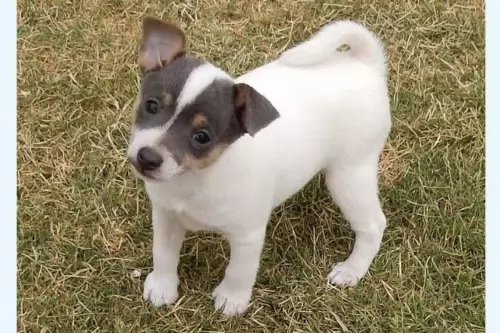 The Tenterfield Terrier is square and compact. He has a head shaped like a wedge and unusual in the terrier group. They have pricked ears and are predominantly white mixed with tan or black. They could also be tri-colored in black/tan and white or tan/liver and white. They have naturally occurring bob tails or docked tails. The nose is usually black unless the dog is liver colored, they have liver noses. The jaws are strong, and lips are tight with a strong neck.
The Tenterfield Terrier is square and compact. He has a head shaped like a wedge and unusual in the terrier group. They have pricked ears and are predominantly white mixed with tan or black. They could also be tri-colored in black/tan and white or tan/liver and white. They have naturally occurring bob tails or docked tails. The nose is usually black unless the dog is liver colored, they have liver noses. The jaws are strong, and lips are tight with a strong neck.
 This is a sociable, lovable, friendly breed. They are gentle and docile dogs that want only to please you. They like children as well as adults and will never be a guard dog as they are friendly to strangers as well. The Braque Francais Pyrenees is affectionate while being highly skilled hunters. They are prone to severe separation anxiety if left alone for long. They might even have a tendency toward shyness.
This is a sociable, lovable, friendly breed. They are gentle and docile dogs that want only to please you. They like children as well as adults and will never be a guard dog as they are friendly to strangers as well. The Braque Francais Pyrenees is affectionate while being highly skilled hunters. They are prone to severe separation anxiety if left alone for long. They might even have a tendency toward shyness.
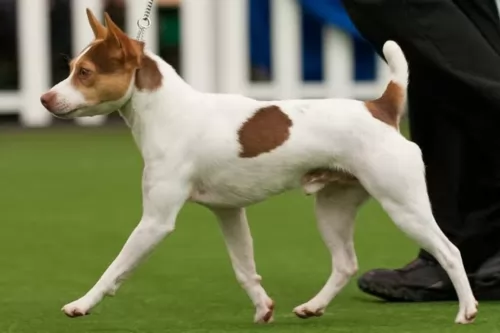 3.Adaptability – they need space even though they are small. They need a lot of exercise. They can adapt if they get another exercise. They can live in apartments and can play indoors as well as out.
3.Adaptability – they need space even though they are small. They need a lot of exercise. They can adapt if they get another exercise. They can live in apartments and can play indoors as well as out.
4.Learning ability – They are extremely intelligent, but they can be stubborn like all terriers.
 The breed of Braque Francais in both its incarnations is generally a pretty healthy dog. They are prone to several issues including dysplasia of the elbow and hip, aortic stenosis, some eye issues and patellar luxation. The eye issues are around the lids and include ectropion and entropion along with cataracts and progressive retinal atrophy (PRA). These issues are not avoidable, but the risk can be reduced even more by breeder testing of parents of any litter and then test the litter. Both the OFA and CERF should conduct tests for the dysplasia (Orthopedic Foundation for Animals) and eyes (Canine Eye Registration Foundation).
The breed of Braque Francais in both its incarnations is generally a pretty healthy dog. They are prone to several issues including dysplasia of the elbow and hip, aortic stenosis, some eye issues and patellar luxation. The eye issues are around the lids and include ectropion and entropion along with cataracts and progressive retinal atrophy (PRA). These issues are not avoidable, but the risk can be reduced even more by breeder testing of parents of any litter and then test the litter. Both the OFA and CERF should conduct tests for the dysplasia (Orthopedic Foundation for Animals) and eyes (Canine Eye Registration Foundation).
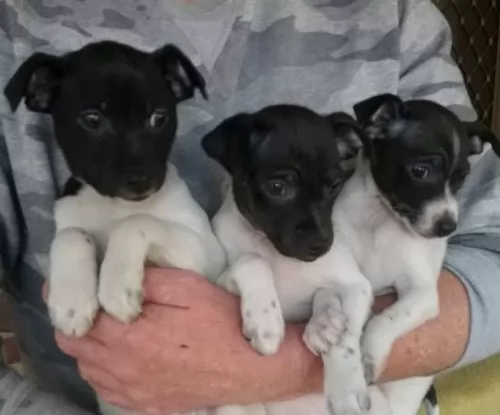 They are small in stature and because of their face they seem to have dental issues. The breed does not have a lot of health issues but deals with the same issues as many small terriers. Not all members of the breed are susceptible to these, but some are just like the Australian Terrier.
They are small in stature and because of their face they seem to have dental issues. The breed does not have a lot of health issues but deals with the same issues as many small terriers. Not all members of the breed are susceptible to these, but some are just like the Australian Terrier.
 This breed need a high energy food including raw meat such as chicken, fish, and beef. If feeding kibble, they need about 2.5 cups per day.
This breed need a high energy food including raw meat such as chicken, fish, and beef. If feeding kibble, they need about 2.5 cups per day.
Prone to inflammation and infections of the ears as they are long and floppy. Clean them regularly. As previously mention eye disorders, joint dysplasia and bloat.
The Braque Francais Pyrenees is a fairly versatile hunting dog. They can hunt on all types of terrain by trailing, flushing and retrieving. They are quick and move quickly without actually sprinting. This dog needs serious exercise every day. They will walk or jog with you. They will run along side your bike. Whatever you choose to do, do it for an hour a day. Don’t make couch potatoes out of this breed. It will not turn out well if you do. They need a place where they can play off leash as well, such as a large yard or a dog park.
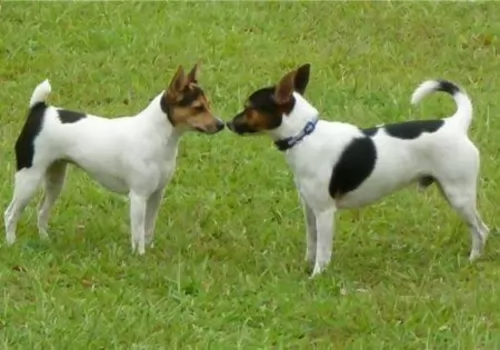 1.Feeding the puppy – Don’t overfeed but do feed high quality puppy food for small breeds and terriers.
1.Feeding the puppy – Don’t overfeed but do feed high quality puppy food for small breeds and terriers.
2.Feeding the adult – This is an active breed but don’t overfeed. Feed a high quality adult dog food for terriers or small breeds. Feed 2 times a day.
4. Games and Exercises – The breed has a high energy level and needs a lot of exercise. He is a terrier and loves to “go to ground”. Play activities that allow him to do that are best. He plays barn hunt, lure coursing and terrier specific competitions.